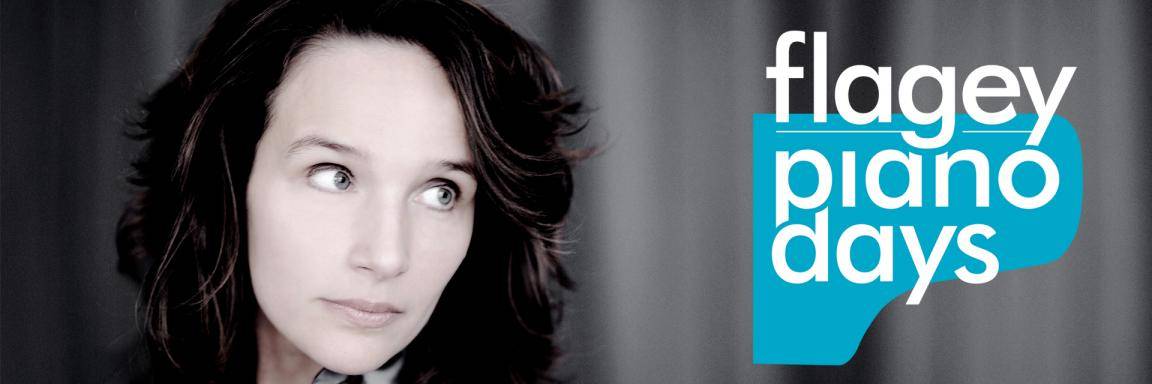52 white keys and 36 black ones: there are few instruments with a history so rich and diverse as the piano. Ranging from Mozart’s 23 concerti to the improvisations of Thelonious Monk. The instrument inspires. We spoke to three young pianists, each approaching the piano in their own way, in their own genre. “Honestly, I don’t think much about genre. The concept doesn’t really exist anymore.”

© Mat Hennek-DG
Genre-bending pianists at Flagey's Piano Days
Poppy Ackroyd

“I mean, you just have to do what’s natural to you. I don’t compare myself to other artists.” That’s the answer you get when you ask the British Poppy Ackroyd how she makes her way as a young pianist. Which she has. Both as a musician with Joe Acheson’s Hidden Orchestra and as a solo artist, releasing two very diverse albums on Björk’s label One Little Indian.
Ackroyd herself is classically trained on the violin and the piano. That classical sound came to the forefront on the minimal Sketches. However, on her latest album Resolve she infuses that classical sound with dreamy synths. Because of that, she easily gets compared to neoclassical composers like Nils Frahm. “It’s such a stupid label, don’t you think? It’s just way too broad."
"They tend to use ‘neoclassical’ for everyone who grew up listening to classical and electronic music. I mean, Shostakovich used to be called a neoclassical composer and nowadays the label applies to both me and Max Richter. But I wouldn’t say my music sounds similar to either one of those.”
Neoclassical, that’s such a stupid label, don’t you think?
In case you were still wondering. Poppy Ackroyd is not a big fan of people trying to define her music. “I like the idea of everything being fluid. Twenty years ago, a musician and his audience were in a box. You listened to punk, or jazz, or hip hop, or classical... Nowadays you can listen to anything at the click of a button. That’s great for a listener but also for a musician, because you can get inspired by all these different people.”
So it’s not all bad news, this Spotify generation. “Obviously it has its flaws, like the fact that you need an insane amount of plays to actually make money. But yeah, I like the fact that it’s so much easier now to access all the music in the world. It gives you a broader palette of styles you could work with. It doesn’t immediately make me go: ‘Oh I heard this or that and now I want to make an album like that.’ To me it’s just another step in the process of developing my music into a sound that I like.” Very fluid indeed.
7/2, 22.15
Víkingur Ólafsson

© Ari Magg
Reviewers cannot find enough superlatives to describe the qualities of the Icelandic pianist Víkingur Ólafsson. After the release of his first album for Deutsche Grammophon, people hailed him as the best interpreter of Philip Glass. Now, with his new Bach album, he’s being called the best Bach performer of his generation.
“At first people wanted me to keep playing minimalist music, now they scream that I must keep playing Bach. But for me it’s important to stick to what I love. That’s where I feel I can make the difference as an artist: by convincing your audience that you’re honest about the music you play.”
Ólafsson agrees that the existence of a musical canon can sometimes be limiting. “There’s an older generation of listeners who are embedded with this canon. But for me it feels like there’s a newer generation standing up. People who want to breathe new life into the classical music scene. Of course, it’s all about balance. You can’t stop playing iconic works all of a sudden.”
“I don’t agree with strict categorization, you can’t pinpoint art”
Though he has recorded music from very diverse time periods, up till now Ólafsson has always stuck to the classical repertoire. “But if I had a choice, I’d prefer to be called a musical pianist instead of a classical pianist. I just don’t agree with strict categorization, you can’t pinpoint art. Even in the classical repertoire there are composers like Gershwin who lean more towards jazz. That fluidity between genres is only becoming more and more obvious now that there’s immediate access to so much music and the sheer volume of music continues to grow as well.”
But that growing fluidity between genres doesn’t immediately inspire him to actually break out of his own genre. “Immensely interesting things have happened on the crossroads between folk, jazz, and classical. The Swedish composer Jan Johansson for example. I don’t want to say right now that I’m never going to do an album with music like that. Because who knows, maybe one day I’ll feel really passionate about it. And like I said, you need that passion to play to the fullest of your possibilities.”
9/2, 14.00
Jacob Collier

From his bedroom to worldwide recognition: that’s about the easiest way to describe the career path of Jacob Collier. The young British multi-instrumentalist started off arranging popular songs and theme tunes in his YouTube videos. These raked in millions of views and won him two Grammy awards in 2017.
His sophomore album Djesse (Vol. 1) is the first of a self-proclaimed “four-album journey through every different musical genre under the sun.” So what should you make of his music? “I don’t think much about genre. The concept doesn’t really exist anymore. In 2019, particularly for us millennials, musicians are free to explore whatever styles they wish, learn about these styles, and connect with musicians all over the world. It’s a great time to be creative.”
“From Stevie Wonder to Bach and Herbie Hancock to Keith Jarrett, it’s all the same language to me”
Even though he is billed nearly everywhere as a jazz musician, and he’s being mentored by Quincy Jones and Herbie Hancock, Jacob Collier wants to be a lot more than that. “I certainly don’t think of myself as a jazz musician or a jazz pianist. The musical tradition of the piano is rich, but I’ve always listened to many kinds of music inside that tradition. From Stevie Wonder to Bach to Bartók to Keith Jarrett to Herbie Hancock. It’s all the same language to me. My job as a creative person is to describe a universe that sounds authentic to me. I’ll leave it up to other people to define where I fit in that tradition.”
That doesn’t sound like he’s too bothered by this lack of a label for his music. As long as his voice gets heard. “I think it’s a great privilege to make a living by creating things and sharing them with people, especially if these people come to admire you for being yourself. If you have something to say, opportunities to reach people are always of value.”
Read more about: Elsene , Muziek , Piano Days , Víkingur Ólafsson , Jacob Collier , Poppy Ackroyd , Flagey




Fijn dat je wil reageren. Wie reageert, gaat akkoord met onze huisregels. Hoe reageren via Disqus? Een woordje uitleg.